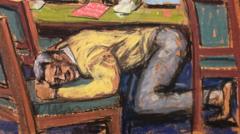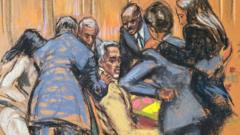Two prominent experts in the French antiques market, Georges "Bill" Pallot and Bruno Desnoues, were found guilty of orchestrating a scheme involving the forgery of historic chairs purportedly owned by French royalty, including Marie Antoinette. They received four-month prison sentences alongside longer suspended penalties and substantial fines; however, they will not face additional prison time due to having already spent four months in pre-trial detention.
The case marked the culmination of a detailed nine-year investigation that has shaken the foundations of the French antiques community. In a recent court ruling from Pontoise, north of Paris, the judge imposed fines amounting to €200,000 (£169,500) on Pallot and €100,000 on Desnoues for their involvement in the counterfeit furniture scandal.
During the trial, it was contended that Laurent Kraemer and his Paris gallery failed to carry out proper due diligence on the authenticity of the chairs before selling them to high-profile collectors, including a member of the Qatari royal family. However, they were acquitted of gross negligence, with lawyers asserting the gallery was a victim of fraud, stating, “It didn't know the furniture was fake, and it couldn't have detected it.”
Pallot, once viewed as a leading authority on 18th Century chairs and a lecturer at the Sorbonne, utilized his access to Versailles Palace records to identify missing chairs, creating replicas with the expert craftsmanship of Desnoues, a notable woodcarver. Pallot remarked, "Everything was fake but the money," indicating the extent of the deception.
Prosecutor Pascal Rayer underscored the case's significance for illuminating the largely opaque antiques market, calling for improved regulation to enhance transparency and fairness in transactions. The unfolding events reflect ongoing concerns regarding integrity within the antiquities sector, particularly exemplified by prior cases like that of Jean Lupu, who faced allegations of similar forgeries before his death earlier this year.
The verdicts will likely spur further discussions on the need for safeguarding the historical authenticity of antiques, as the implications reach far beyond the individual defendants to encompass the broader market and its ethical responsibilities.





















